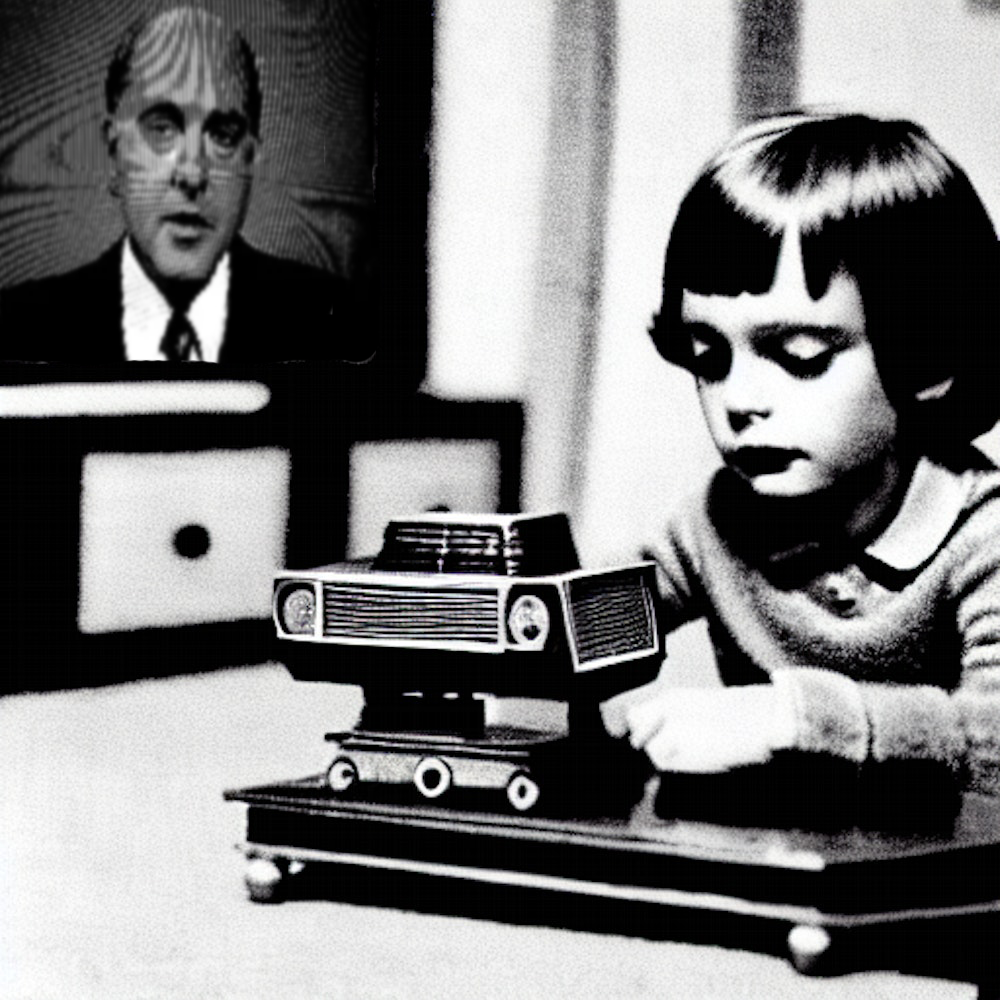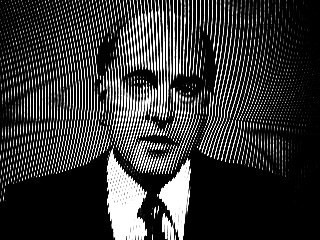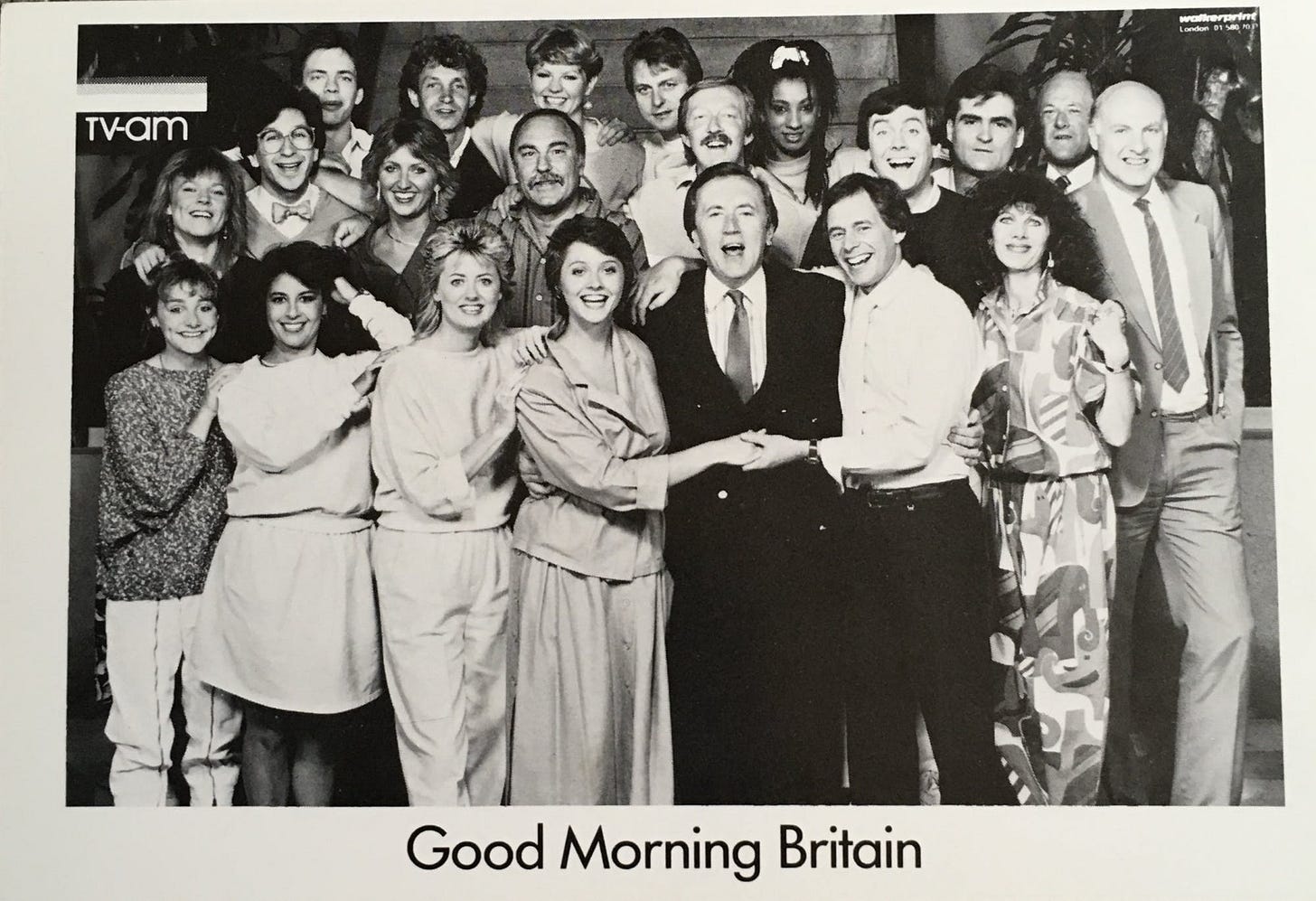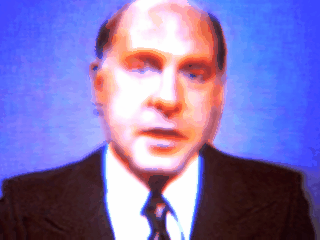The Hauntological Ghost of Gordon Honeycombe
When a popular TV personality makes their first appearance in your childhood nightmares
I have lasting memories of nightmares from about the age of 4 or 5. This was in the early 1970s. I once had a dream that I was in my lounge sitting in front of the TV. It was in the early hours of the morning, when I should have been tucked up in my bed, and it was dark and I was all alone. The television suddenly came on on its own. A man started reading the news. After a short while, the screen started to take on a blue tinge and the newsreader began shouting at me through the TV. I got so scared that I tried to wake up but the man kept shouting and getting really angry with me. I fought to wake up but I eventually did.
I thought not much more about it. Then it wasn’t until the January 1984 when Gordon Honeycombe appeared on launch show of TV-am a new breakfast show on ITV and it started to dawn on me that the nightmare from my early childhood might actually be unfolding on TV. I was so startled that I nearly spat out my breakfast cereal.
Why does television from the 1970s have the ability to conjure such hauntological memories?
Well, it was a period of significant cultural, political, and technological change, and as the most popular medium of that time, television played a major role in reflecting and shaping these changes. Television was a central part of people’s lives and formed an important part of their collective cultural memory.
However, for those of the haunted generation who experienced the 1970s through a mostly terrified childhood lens, (see Threads, Children of the Stones, Picture Box, Public Information Films etc.) the passage of time has transformed the way we view and understand the 1970s, and this has contributed to a sense of hauntological fragments and memories that some people experience when they think back to that era. Hauntology, first coined by French philosopher Jacques Derrida and explored at length by the author and music and cultural critic Mark Fisher described the idea that the past can continue to exert a ghostly presence in the present, ever more so as it recedes further into history.
In the case of 1970s television, this hauntological effect may be due to the fact that many of the shows and cultural phenomenon have become iconic and are now viewed through a nostalgic but ghostly lens. This means that sometimes they can evoke feelings of loss, longing and strange disconnection from the present.
In my experience, in the dream state, the breaking of the fourth wall, when a character or TV personality or stage performer acknowledges the audience or the fact that they are in a performance, was a jarring, eerie and unsettling experience. The fact that I had no knowledge of who Gordon Honeycombe was at that age, or much knowledge of what a newsreader was, only makes for it to be more of an unsettling experience, especially that I wasn’t accustomed to seeing news presenters behave in this way or even the news itself, as a far as I was aware. I’ve since found out that Gordon Honeycombe appeared as a newsreader in several films and plays, so I suppose its possible that I could have received a fragmentary memory of one of those performances, which contributed to my nightmare.
The eerie nature of the landscape is something we have explored in our first album, and our interest in our connections to the past through ancestors and folklore. The eerie and hauntological memories of our past seem to be increasingly of interest to us, and these themes are bound to crop up as part of our creative work in the near future.






That gif is indeed terrifying. I'm guessing you already know this, but Honeycombe wrote a couple of strange novels. Dragon Under The Hill is more of a traditional horror novel, set on Lindisfarne, but Neither the Sea Nor the Sand is somewhat stranger. Made into a film with Susan Hampshire.
yes i can relate to the hauntology of past media from the 70s/ 80s, im about half your guy’s age it seems so i’ve never lived with that era the same way you have but im sure you’ve heard about the music genre of vaporwave which was an important part of my musical journey for myself. the use of old samples of tv and commercials from them had a very powerful effect on me, all the senses of disconnection/ longing etc. The instrument the mellotron also featured in a lot of the music i was into from this era as well which carries a similar sentiment, have you guys ever experimented with the mellotron? i feel it could pair well with your music